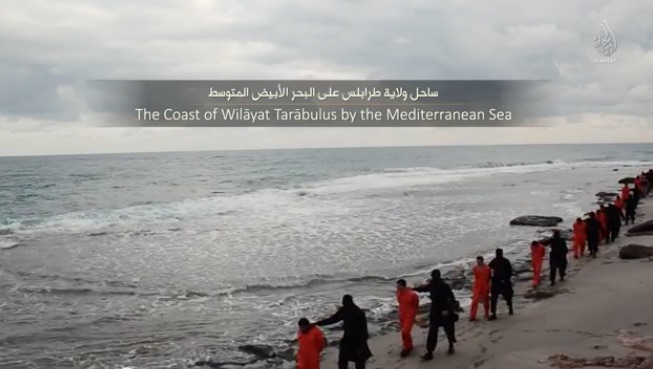By Libya Herald reporter.

Tripoli, 15 February 2015:
The 21 Egyptian Coptic Christians held by supporters of the Islamic State in Sirte are . . .[restrict]believed to have been murdered by their captors. A horrific video has been released which shows a number of men wearing orange execution suits being killed on a beach and their heads cut off. The water’s edge is red with the men’s blood.
It is not known where or when the murders took place.
The five-minute video distributed on YouTube shows the same beach scenes as in photos appearing in a IS online magazine last week and suggests that the killings took place shortly after the first first photos and that the whole gruesome exercise was organised by the IS for maximum propaganda effect.
Violently anti-Christian, it says it was taken in the “Wilayat of Tarabulus” (governorate of Tripoli), but that could include Sirte, now under IS control. It ends with one of the killers holding up his knife and saying in impeccable English: “And we will conquer Rome, by Allah’s permission.”
The accent is not that usually associated with a Libyan speaking English. It sounds more like a resident from a Gulf state. The very professionally-made video itself uses Arabic transliterations more common to British academic institutions.
A military response is expected from Egypt which has taken the unprecedented step of declaring seven days of national mourning for the murdered men, describing them as “martyrs”. The killings have united Egypyians, Muslims and Christians alike, in horror at the killings and have put intense pressure on the Egyptian authorities to react. Egyptian President Abdel Fattah El-Sisi, speaking on TV about them, has said that Egypt will respond in its own time and in its own way.
The killings have been condemned by the Libyan army. The spokesman for the Chief of Staff, Colonel Ahmad Masmari, said that IS was an international threat and that the international community had to give the army to wherewithal to fight it.
The UN Support Mission in Libya (UNSMIL) has strongly condemned the IS action, describing it as a “terrorist crime”. For his part, the Libyan ambassador in Cairo, Ambassador Mohammed Fayez Jibril, called IS as a “cancer” in Libya which has managed to flourish because the country is weak. [/restrict]








